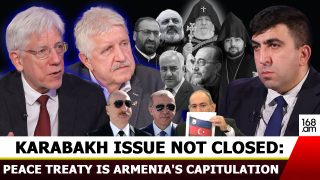Azerbaijani Top Official Confirms Azerbaijan Initiating Assault on Armenian Region

The First Deputy Speaker of the Azerbaijan’s parliament, Ziyafat Askerov, was quoted by Azeri media confirming that the Azerbaijani army has indeed launched a large scale military assault on Armenian forces on 2 April. Askerov, who heads the parliamentary committee for defence and security issues, stated that the Armenian side was in panic “as a result of the assault of our [Azeri] army”.
The Azeri top official went on saying that the assault came after his country’s president Ilham Aliyev concluded a successful official visit to the US. The Deputy Speaker did not elaborate further on the connection between the official talks in the US and the surprise large scale military assault along the Line of Contact that has claimed at least 200 lives on both sides, although the official reports on casualties dramatically vary.
Askerov’s statement contradicts the Azerbaijani authorities’ earlier insistence that the Armenian side was to blame for the heaviest fighting along the Line of Contact since 1994, when the current ceasefire deal was agreed. Later on 2 April the Azeri media sources published the statement by the Azeri Defence Ministry admitting the launch of the attack. Still, the Azerbaijani President Ilham Aliyev using social media outlets later in the day, accused the Armenian side for attacks, once again contradicting to his own defence ministry and parliamentary official’s claims.
Traditionally, the parties to the conflict have always blamed each other for cross – border clashes. However, it is only the Azerbaijani government that has been actively sporting for the military solution to the conflict, despite regular warnings from Armenia, as well as the international mediators from US, France and Russia, tasked with finding a peaceful resolution to the conflict.
While details of the latest deadly escalation are emerging, it is worth mentioning that satellite imagery available to independent international security analysts has shown that in the last six months the Azeri military have been amassing military hardware and conducting military drills along the Agdam, Fizuli and Djabrayil regions controlled by the Nagorno Karabakh, in the southern and south-eastern parts of the NK. Today’s reports from Azerbaijan and Armenia confirmed that these regions were seeing the heaviest fighting. This implies premeditation on behalf of Azeri forces, contrary to the Azeri official statements claiming that the assault on 2 April was a simple response to the Armenian alleged shootings.
Militarily, Armenia has nothing to gain from the new war. The Armenian forces were victorious in 1988-1994 war, decisively defeating the Azeris, who were trying to suppress the independence movement of mainly Armenian Nagrono Karabakh region, after the collapse of the Soviet Union in 1991. However, for Azerbaijan with its newly found oil and gas generated wealth, military solution appears increasingly more attractive. Rather than compromising on the status of the Nagorno Karabakh region, that has been de facto independent for over 20 years, Azerbaijan’s long standing current president Ilham Aliyev has been lured by the idea of using his country’s wealth to solve the conflict on his own terms. Not surprising, Azerbaijani is frustrated with the international mediators of the Nagorno Karabakh conflict since they expect from Aliyev to agree to a compromise deal, which President Aliyev thinks he has forego since he has larger military budget and bigger economy than Armenia.
Whatever justifications the Azeri officials try to bring for launching the deadly assault on 2 April against the Armenian region, their decision pushed the conflict one step closer to a full scale war. The unprecedented heavy fighting in the more than 20 years took dozens of lives in one day, including that of an 12 year old Armenian boy when his school was targeted by Azeri military. The erratic handling of the media by the Azeri authorities, where contradictory statements are made by the Azeri president and the high level officials only point confirm that the Azeri authorities are not entirely genuine about their role in this unfolding tragedy.
“168 Hours”

























